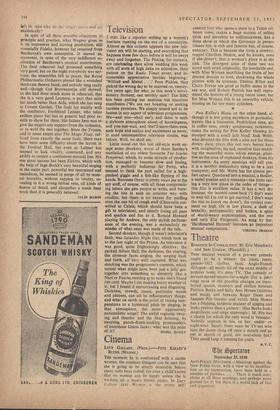Cinema
LUCY GALLANT. (Plaza.)----PETE KELLEY'S BLUES. (Warner.) THE moment he is confronted' with a career woman, the constant filmgoer can be sure that she is going to be utterly miserable before many reels have rolled; for even a child knows that no woman can he happy unless she is wa.bing U a man's dinner plates. In Lucy (;allant Jan,: Wyman the pretty self-
assured fool who opens a store in a Texan oil- boom torn, makes a huge success of selling mink and marabou to millionairesses, has a dress show at which the Governor in person blesses her, is rich and famous but, of course, unhappy. This is because she loves a cowboy, rugged Charlton Heston, and he knows, even if she doesn't, that a woman's place is at the sink. The divergent aims of these two arc noted with small originality, the inevitable end, with Miss Wyman sacrificing the fruits of her dearest dreams to love, shadowing the whole picture with its triteness. Thelma Ritter and Claire Trevor are good as buffer states in the sex war, and Robert Parrish has well repro- duced the horrors of a young boom town; but for Miss Wyman this is an unworthy vehicle, missing on far too many cylinders.
Pete Kelley's Blues, on the other hand, al- though it is not going anywhere in particular, travels like a limousine. Prohibition time, gin in coffee urns, smoky speakeasies, racketeers, make the setting for Pete Kelley blowing his trumpet with a small jazz band. Jack Webb. who directed the film with a nice eye for those dreary days, plays this not very heroic hero with imagination, his sad, sensitive face match- ing the mournful notes which emerge, plain- tive as the cries of orphaned donkeys, from his instrument. As every musician will tell you, it is a terribly melancholy thing to be a jazz trumpeter, and Mr. Webb has the almost per- fect cafard. Quartered into a musical, a thriller, a social treatise and a romance—the latter tak- ing a very low place in the order of things— this film is excellent value. It has a wry dry humour, the laconic come-back ('I don't want to wait till I'm old to get married; I don't want the rice to knock me down'), the cynical com- ment on high life in low places, a dash of brutality, sentimentality and bathos, a spice of world-weary sophistication, and the one and only Ella Fitzgerald. As sung by her, 'Hardhearted Hannah' becomes an important
































 Previous page
Previous page